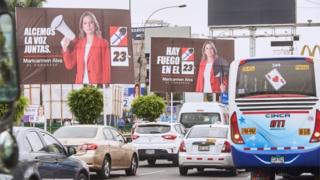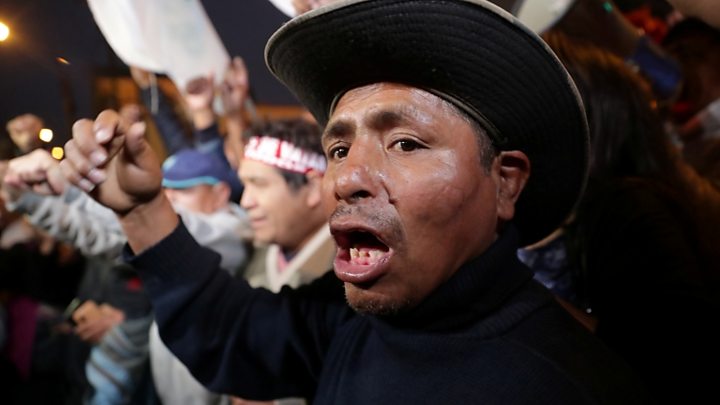This website uses cookies so that we can provide you with the best user experience possible. Cookie information is stored in your browser and performs functions such as recognising you when you return to our website and helping our team to understand which sections of the website you find most interesting and useful.
 Image copyright EPA
Image copyright EPAPeruvians will go to the polls on Sunday to elect a new Congress after the previous one was dissolved by President Martín Vizcarra.
Mr Vizcarra took the drastic step in September, arguing that lawmakers were obstructing his anti-corruption agenda.
Polls suggest that half of the voters are undecided, making the election for the 130-seat chamber unpredictable.
Twenty-one parties are running and polls suggest centrist politicians could win a majority.
Fragmentation ahead?
The right-wing Popular Force, which was the dominant party in the last Congress, is expected to lose seats but to still emerge with a sizeable number of lawmakers.
The party is led by Keiko Fujimori, the daughter of disgraced former President Alberto Fujimori. Mr Fujimori was found guilty of human rights abuses and corruption.
Ms Fujimori is awaiting trial on charges of corruption, which she denies.
Under Peru's electoral laws, parties need to achieve at least 5% of the popular vote or seven elected legislators to gain representation. The high number of undecided voters could result in a fragmented assembly.
President Vizcarra had made the fight against corruption his main priority when he took power in March 2018 after then-President Pedro Pablo Kuczynski resigned over a vote-buying scandal. When parties, including the Popular Force, blocked his efforts, he dissolved Congress.
- Peru in turmoil after President Vizcarra dissolves Congress
- Peru's top court says dissolution of parliament was legal
His tough anti-corruption stance endeared him to Peruvians tired of the endless scandals that have tainted not only Mr Kuczynski but also the three previous Peruvian presidents.
Peru's scandal-tainted presidents:
- Pedro Pablo Kuczynski: Under house arrest while under investigation for alleged corruption linked to Brazilian construction giant Odebrecht
- Ollanta Humala: Accused of accepting $3m (£2.2m) in illegal financing from Odebrecht for his electoral campaign
- Alan García: Killed himself in April 2019 as police arrived to detain him over bribery allegations also linked to Odebrecht
- Alejandro Toledo: In jail in the US; Peru has requested his extradition for allegedly taking $20m in bribes from Odebrecht
Voting is mandatory in Peru, Latin America's fifth-largest economy, and some 25 million people are eligible to vote. The new Congress will finish the current legislative term, which ends in July 2021.
Earlier this month, the constitutional court said President Vizcarra, a centrist politician, had not exceeded his powers when he dissolved the chamber.
Opposition lawmakers had denounced the dissolution of Congress as a coup but the heads of the armed forces and the police backed the president. Supporters of Mr Vizcarra turned out to show their approval of the move.

Media playback is unsupported on your device



 Africana55 Radio
Africana55 Radio 
